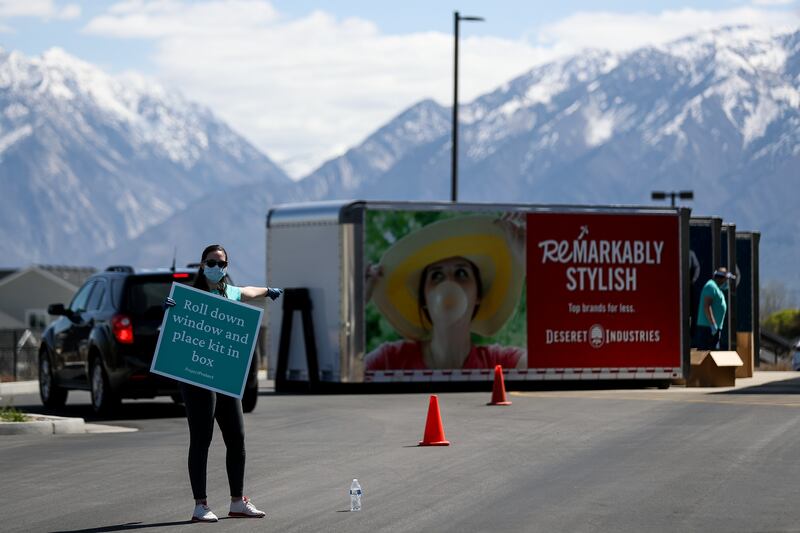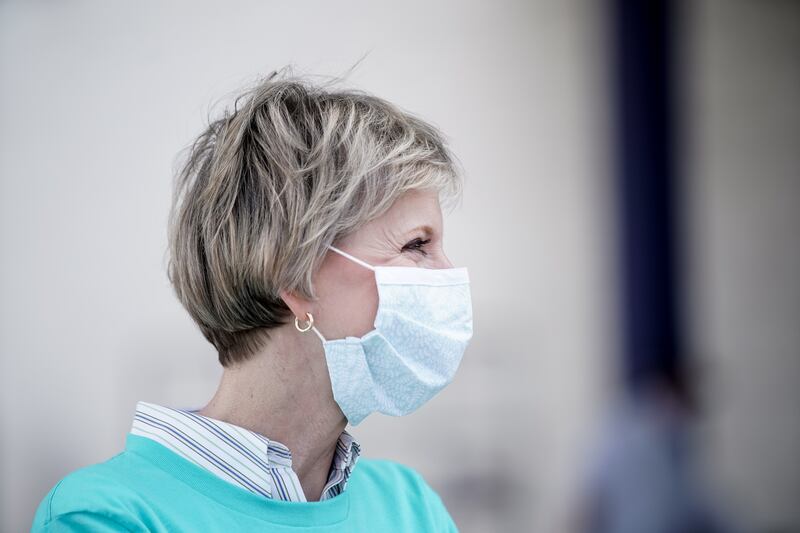AMERICAN FORK, Utah — Volunteers returned Saturday with about 1 million medical-grade masks they sewed for Utah’s health care workers during the first week of ProjectProtect, a pandemic-related effort to produce 5 million masks in five weeks.
Thousands pulled up in their cars, rolled down their windows and tossed out bags of 100 freshly made masks into boxes at Deseret Industries locations in American Fork, Harrisville, Layton, Murray and Riverton. Then many of them returned home to sign up to it all again next week.
“I wanted to help in some way so I could be part of something happening that’s never happened in my lifetime or even my parents’ lifetime,” said Stephenie Roundy of Provo.
ProjectProtect’s goal is to have 10,000 volunteers make 1 million masks every week for five weeks. Workers were boxing the masks on Saturday afternoon and did not have an estimate of how many masks were returned.
Deseret Transportation trucks will drop off the kits for the second 1 million masks at the DI locations on Monday, then load up the first 1 million completed masks and deliver them to a location where they will be sanitized. After the masks are cleaned, they will be distributed to health care workers at Intermountain Healthcare and University of Utah Health.
The excitement and energy was palpable in American Fork, even though no one got out of their cars during a drop-off period that ran from 10 a.m. to 12:30 p.m., said Megan Bailey, a project manager at University of Utah Health. The seamsters and seamstresses smiled, some cheered and some apologized for making a mistake here and there.


Volunteers had picked up the kits on Tuesday at the same Deseret Industries locations. Each kit contains material to make 100 masks.
Roundy split her kit with two neighbors. Each sewed about 30 masks. Roundy said the job took her a couple of hours.
“The sewing part was very easy,” she said. Her husband, Kent, supported her by making chocolate chip cookies.
ProjectProtect is a partnership of Intermountain Healthcare, University of Utah Health and Latter-day Saint Charities. It includes a number of additional partners and companies.
The entire Relief Society general presidency of The Church of Jesus Christ of Latter-day Saints visited the drop-off sites on Saturday to thank volunteers.
“Today has been fantastic,” said Sister Jean B. Bingham, the Relief Society general president, who visited the Harrisville dropoff.
“Car after car would drive up with any number of people — family groups, an individual, young, old, male, female,” she said. “They would hand off these masks and almost every time each person would say, ‘thank you.’ And we want to say, of course, ‘thank you’ to them. But they were thanking us for the opportunity. That has been the great thing about being here today.”
Sister Sharon Eubank, president of Latter-day Saint Charities and first counselor in the presidency, stopped in at the Riverton site.
“Unlike other mask projects which are also very useful in the community, this project makes medical-grade masks for uses in care centers, hospital systems, emergency rooms, things like that,” she said.
“To me this really points out this is Utah,” she said. “This is who we are and we respond to situations like this.”
Sister Reyna I. Aburto, second counselor, visited the Layton site.
Some volunteers reported facing obstacles during the week and posted their experiences on the project’s Facebook group. Some said they broke multiple sewing-machine needles, others made mistakes folding the masks’ seams and still others said their sewing machines struggled. And yet the jobs were completed.
Bailey is new to sewing. She made 100 masks herself. She said it took her about 15 hours. She sewed every evening after work.
Some volunteers experienced difficulty with the online registration last weekend. The trouble was caused by huge numbers of volunteers trying to use the website, ProjectProtect.health, all at once. Those glitches have been fixed, Bailey said. Those unable to sign up for the first week were given early registration priority for the second week, she said.
ProjectProtect ran out of kits at the end of Tuesday’s pick-up. Bailey said organizers believe that the online registration problems caused the computer system to lose some registrations.
Several hundred volunteers with registration confirmations showed up for kits during the final hour on Tuesday only to find them all gone. Bailey said those volunteers also had priority registration status for the second week.
Some are using the social media hashtag #5Million5Weeks to describe ProjectProtect, which needs 10,000 volunteers per week.
Bailey said registration has been streamlined and the numbers signing up for the second week is strong.
“There are still openings,” she said at mid-day Saturday. “We expect them to be filled by the end of the weekend.
The kits for the second week will be handed out at the same Deseret Industry locations on Tuesday.
“It’s cool to see the community come together,” Bailey said. “You could see today that people really cared about finishing the masks and doing them right.”
Contributing: Sarah Jane Weaver

